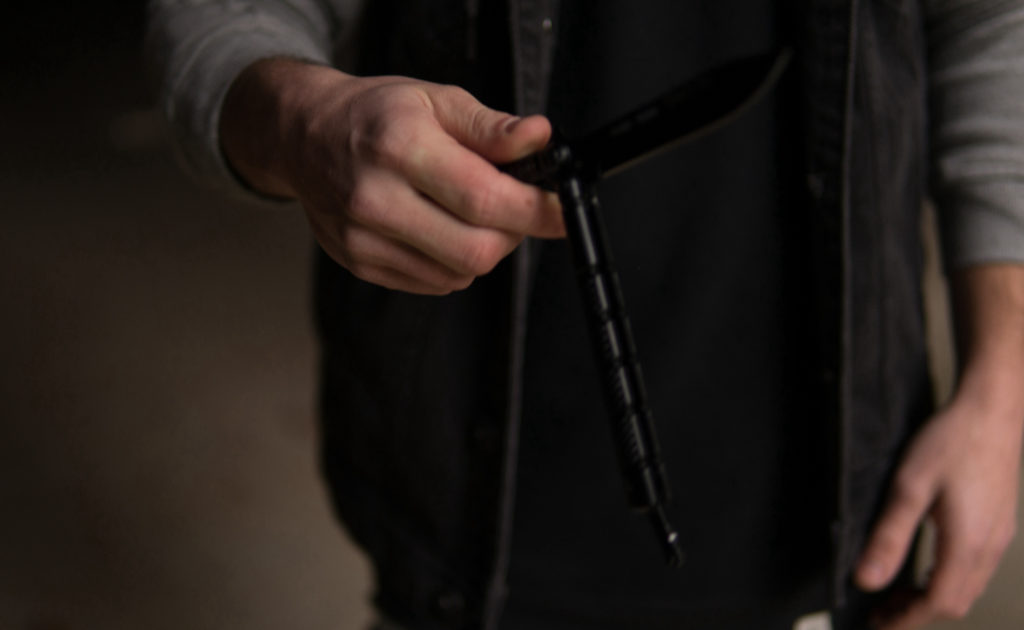Nevada Knife Laws: What You Need to Know About Knife Laws in Nevada

In Nevada, it is legal to carry a knife in public as long as the blade is shorter than four inches. However, there are some restrictions on what types of knives you can carry. For example, it is illegal to carry a switchblade, stiletto, or balisong knife in public. It is also illegal to concealed carry any knife, regardless of the blade length.
Open carry of knives is generally allowed in most public places, with a few exceptions. These exceptions include schools, government buildings, and airports. It is also important to note that you may not use a knife in a threatening or violent manner. Doing so can result in criminal charges, even if the knife itself is legal to carry.
According to NRS 202.350, the unlawful carrying of a weapon in Nevada is a misdemeanor offense. A person convicted of this offense can face up to 6 months in jail and/or a $1,000 fine.
There are also enhanced penalties for certain types of knives. For example, it is illegal to carry a switchblade knife with a blade longer than 2 inches. Carrying a switchblade with a blade longer than 2 inches is considered a category C felony in Nevada, which carries a prison sentence of 1 – 5 years and/or up to a $10,000 fine.
What Knives Are Legal In Nevada And Which Ones Are Illegal
Nevada does not have a statewide preemption. This means that localities are allowed to enact their own knife laws as long as they do not conflict with state law. As a result, there is some variation in knife laws from one city to the next. For example, Clark County requires a permit to carry a concealed knife with a three-inch or longer blade.
It is important to check the laws in your specific city or county to make sure you are in compliance.
Important Knife-Related Definitions You Need to Know
Switchblade Knife
A switchblade knife is a type of knife with a blade that can be deployed automatically by a spring-loaded mechanism. Switchblade knives are also sometimes referred to as “automatic knives” or “switchblades.”
The Blade
The blade is the sharpened edge of the knife that is used for cutting.
Open Carry
Open carry refers to the practice of carrying a weapon in plain sight, typically in a holster or sheath.
Concealed Carry / Weapon
Concealed carry refers to the practice of carrying a weapon in a hidden or concealed manner.A knife is only considered concealed if it’s carried in a way that makes it hidden from sight. For example, if you carry a knife in your pocket or bag, that is considered a concealed knife.
Dangerous Weapon
A dangerous weapon is any weapon that is capable of inflicting serious bodily injury or death.
Dangerous Knife
A dangerous knife is any knife that is capable of inflicting serious bodily injury or death.
Brandishing a Knife
Brandishing a knife is the act of displaying a knife in a threatening or menacing manner.
Threatening / Menacing
Threatening or menacing behavior is any conduct that would cause a reasonable person to feel fear for their safety or the safety of others.
The Laws Surrounding Carrying Knives in Nevada
As mentioned above, Nevada does not have a statewide preemption for knife laws. This means that local governments can make their own.
For example, Clark County law states that people need a CCW permit to carry any type of knife with a blade longer than three inches concealed on their person. So while it is legal to own a knife, if you conceal carry it, you need to have a permit.
According to Nevada Law NRS 202.350, no knife types are considered illegal to own nor does it define which types of knives qualify as dangerous or deadly; However, NRS 202.265 and NRS 202.320 indicate that these knives are dangerous:
- dirks,
- dirk-knives,
- swords,
- sword canes,
- daggers, and
- switchblades
Penalties of Violating Knife Laws in Nevada
Carrying a Concealed Knife Without a CCW Permit
If a person is caught carrying a concealed knife without a permit, they can be charged with a gross misdemeanor. The consequences may include up to 364 days in jail and/or fines up to $2,000.
Possessing a Knife at School
It is against the law in Nevada to possess a knife on school grounds, including colleges and universities. This is considered a gross misdemeanor offense and may result in up to 364 days in jail and/or fines up to $2,000.
Brandishing a Knife
Brandishing a knife in a threatening manner is considered a misdemeanor offense in Nevada. The penalties may include up to six months in jail and/or fines up to $1,000.
It is important to note that brandishing a knife differs significantly from assault with a deadly weapon (NRS 200.471(2)(b)(ADW). ADW is the act of putting another person in anticipation of immediate bodily harm using a knife or other dangerous instrument.
In addition, ADW can be done with only one person, while brandishing a knife requires two people. Also, the penalties for ADW are much more severe than drawing a knife threateningly.
How to Transport Knives in Nevada
There are no specific laws in Nevada that dictate how knives must be transported. However, it is generally a good idea to transport them in a manner that is not easily accessible, such as in a sheath or case.
Common Defenses
There is no simple answer to this question. The best approach to fight Nevada knife charges will vary depending on the specifics of the situation. The following are some potential defenses to Nevada state knife regulations:
Not a Concealed Weapon/Knife
According to NRS 202.350, only a concealed knife requires a permit. Perhaps the police incorrectly believed the knife was concealed when, in fact, it was not.
Surveillance video, photographs, and/or eyewitnesses are often helpful in disproving the allegation that a knife was concealed.
If a prosecutor can’t establish that the knife was hidden from view beyond a reasonable doubt, carrying concealed weapons should not be considered unlawful.
The Blade Is Less Than Three Inches Long
If you are caught carrying a concealed weapon that is longer than three inches, you will face consequences in Clark County. However, if you can prove to the police that they were wrong about the blade’s length, then the charges should be dropped.
Knife Is Not Illegal at Schools
NRS 202.265 specifies exactly which type of knives are considered illegal at schools. If the knife in question does not meet the definition of a dirk, dagger, or switchblade, NRS 202.265 charges should be dismissed.
Expert witness testimony would be beneficial evidence.
Defendant Acted in Self Defense
Nevada law allows people to carry and use knives in self-defense as long as the force is reasonable. If you can show that you only brandished or used the knife to protect yourself from imminent harm, the charges against you should be dropped.
What to Do if You’re Stopped by the Police With a Knife in Nevada

If you are stopped by the police and they discover you have a knife, it is important to remain calm and be cooperative. You should not try to hide the knife or lie about carrying it. If you are arrested, do not say anything to the police until you have spoken with an attorney.
An experienced criminal defense lawyer will be able to assess your case and determine the best course of action. They may be able to get the charges against you reduced or dismissed entirely.
If you are facing charges for carrying a concealed weapon or other knife-related offense in Nevada, contact an experienced criminal defense attorney as soon as possible.
The Defenders is a criminal defense law firm whose lawyers defend clients arrested or charged with DUIs, felonies, misdemeanors, domestic violence, sex crimes), murder, drug possession, white collar crimes and more than a dozen other criminal case categories.
Can the Record Be Sealed?
A conviction for carrying a concealed weapon in Nevada will go on your criminal record. However, it may be possible to have the record sealed depending on the specific offense.
- First conviction of carrying a concealed knife without a CCW permit (gross misdemeanor) –> 2 years after the case ends
- Subsequent conviction of carrying a concealed knife without a CCW permit (category D felony) –> 5 years after the case ends
- First conviction of possessing or using a trefoil with intent to harm (gross misdemeanor)–> 2 years after the case ends
- Subsequent conviction of possessing or using a trefoil with intent to harm (category D felony) –> 5 years after the case ends
- Carrying a knife at school (gross misdemeanor) –> 2 years after the case ends
- Brandishing a knife (misdemeanor) –> 1 year after the case ends
- Dismissed charges (no conviction) –> No waiting period
How to Defend Yourself if You’re Charged With a Knife Crime in Nevada
If you’ve been arrested and/or charged with a knife crime, you’re likely frightened, confused and don’t know where to turn.
Here’s what you need to know.
First, time is critical. You need help now, before the trouble gets any deeper.
Second, the choice of a law firm you make now can affect the outcome of your case and make a lifetime of difference.
You need to work with a Nevada-based law firm, one whose lawyers know the ins and outs of the local court system and laws. The Defenders is that law firm, one with proven results for clients.
We believe every person has the right to an aggressive defense to help protect their freedoms, liberties and keep their record clear.
Whether you’ve been charged with drug crimes, DUI’s, assault, a misdemeanor or a felony, The Defenders will work hard to vigorously defend you throughout every stage of your case.
Contact us today.









